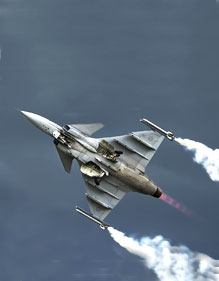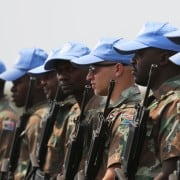|
Getting your Trinity Audio player ready...
|
 By Lee-Ann Alfreds
By Lee-Ann Alfreds
Hennie van Vuuren, the arms deal critic who withdrew from the Arms Procurement Commission in August, appeared before it on Monday, 20 October, as instructed.
The week before, Van Vuuren told Corruption Watch that "I have been summonsed to appear on 20 October and will be at the Arms Procurement Commission at 10am on the day", squashing speculation that he would snub his nose at the inquiry which is probing allegations of fraud and corruption in South Africa's controversial Arms Deal.
However, Van Vuuren – who has co-written acclaimed, exhaustive books on the deal – at the time refused to be drawn about whether he would actually testify. Yesterday he made it plain that he would not. Van Vuuren refused to take the oath or to testify.
Van Vuuren and fellow critics Paul Holden and Andrew Feinstein – who have also been subpoenaed to testify – announced on August 28 that they were withdrawing from the commission because they felt that it was a “waste of taxpayers’ money”. They cited four reasons for their withdrawal:
- Judge Seriti had indicated that he was not interested in hearing evidence from other critics about documents that they had not themselves written or about corruption allegations of which they had personal knowledge. They pointed out that this was “particularly disturbing as this limitation was not applied to previous witnesses who were supportive of the arms deal.
- The commission had consistently failed to provide them with access to relevant documents, which breached their legal rights.
- The commission had refused to admit key documents such as the draft auditor-general’s report (which provides evidence of severe irregularities in the selection process) and the Debevoise & Plimpton report (that provides evidence of actionable allegations of potential corruption).
- Information from staff who have resigned and the commission’s own public conduct, suggests that it does not intend to properly investigate the deal.
After being served with his subpoena last month, Van Vuuren said he was "puzzled" that he had been summonsed given that the commission "through its conduct has made it clear that it favours a process that will treat us unfairly".
An unfortunate turn of events
Before his appearance, Van Vuuren indicated that he was not only standing by his previous comments, but that his stance had been reinforced by Terry Crawford-Browne's treatment on the stand earlier this month.
Crawford-Browne, whose legal action forced President Jacob Zuma to institute the commission of inquiry in 2011, was widely discredited on the stand for peddling unsupported and ridiculous allegations. He had testified that ANC stalwart Winnie Madikizela-Mandela was the leader of the “concerned MPs” who leaked information on the deal. He also alleged former defence minister Joe Modise was poisoned and there were allegations that when South African Communist Party general secretary Chris Hani was assassinated in 1993, he was on the verge of exposing Modise's involvement in, and corruption relating to, the arms deal.
Said Van Vuuren: "Sadly, what we witnessed last week was Terry Crawford-Browne unwisely repeating the unsubstantiated opinions of others. The effect was not only that he undermined his own argument but also that he has made the extremely difficult task of challenging the conduct of the commission much harder. He has made it easy for those who do not want the truth to be found to say that arms-deal critics rely on unsubstantiated rumour and can produce no evidence to substantiate their claims."
But he insisted that he, Feinstein and Holden, could not be tarred with the same brush.
"In the uproar resulting from these claims, the crucial point must not be lost: we have demonstrated through our books, writing and the information we have provided to the commission that there is substantial and substantive documentary evidence suggesting corruption in the arms deal," he pointed out.
He added that the commission's decision to declare the "Debevoise and Plimpton report commissioned by German arms company Ferrostaal (into its own alleged bribery) as a privileged document having …'the same footing as a stolen document', and therefore being inadmissible as evidence" was very significant.
"This means the document cannot be relied on by any witness at any stage — yet another ruling that will block the public’s right to know."
Dismissive of critics
The commission has accused Van Vuuren, Feinstein and Holden of sour grapes and of wanting it to do their investigative work.
“Mr Van Vuuren is amongst the people who are believed to possess important information concerning wrongdoing in the arms procurement. It will be remiss of the commission not to call him,” commission spokesman William Baloyi said at the time the summons was issued.
Baloyi dismissed concerns about the way the commission was being run as “baseless, malicious assertions”.
“The commission cannot be shut down simply because a few individuals are unhappy with it. It should be noted that the commission has already heard evidence running into thousands of typed pages and very important evidence is still to be heard from important witnesses including investigators and implicated people. The baseless, malicious assertions that the commission will be a cover-up and that it has lost credibility will not deter us from executing our mandate,” he said.








